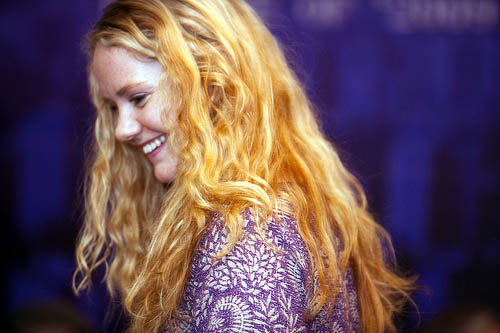Lecturer in Creative Writing, poet Leanne O’Sullivan, above, describes the prestigious Struga Poetry Evenings in Macedonia, a festival where she met a host of international poets, and which is the inspiration behind a new international poetry festival she is curating at UCC this month.
Last August I was invited to take part in the Struga Poetry Evenings in Macedonia – a festival I was both intrigued by and apprehensive about attending. Not least because of reading in Seamus Heaney’s poem, “Known World”, the following account: –
‘Beria! Beria! Beria!’
Screeched Vladimir Chupeski, every time
He smashed a vodka glass and filled another
During those days and nights of ’78
When we hardly ever sobered at the Struga
Poetry Festival.’
Almost 20 years on, the Struga Festival – http://www.struga.org/eng/str_eve_poet_intro.htm – still boasts the participation of writers whose reputation in world literature precedes them. In 1978 Heaney was in good company – in “Known World”, quoted above, he names in that same poem Rafael Alberti and Hans Magnus Enzensberger. At Struga 2016, I tentatively orbited the fearsome presence of Margaret Atwood and had quiet coffees with the great Lithuanian poet Tomas Venclova, with whom I share a publisher.
But one of the wonderful things about attending a festival whose 30 participating poets come from all over the world is actually not knowing who’s who – not being aware who is a god or a demi-god when out amongst their own people and readers. This ignorance of celebrity created a sort of camraderie and lack of self-consciousness in our diverse group, and most of all allowed for one of the most exciting experiences I know of: the discovery of new poetry.
It had been some time since I had fully taken part in a poetry festival, and after a week my head was bursting with these new voices, accents, preoccupations: the strikingly self-possessed Laura Accerboni, the gentle but fierce Aurélia Lassaque, Runa Svetlikova’s strange rooms and Yolanda Castaño who sees poetry in just about everything. There were so many others, and I so much wanted to bring everyone home with me!
There were also other international festival directors scouting talent for their own events, and whenever I was in their company, rather than ‘networking’, I found myself swapping notes about who we had just heard and who I would want to read at my “fantasy” poetry festival.
When I approached the Director of Information Services in the Boole Library, John FitzGerald, about the idea of holding a series of poetry readings at UCC that would feature poets from other European countries along with Irish poets, he was more than supportive. The platform that is given to the arts, and especially to poetry, is one of the truly outstanding qualities of the University. As the language departments also offered their support, this fantasy poetry festival began to flesh itself out, and I’m delighted to say that we will be holding our first readings of the series at the end of this month (February 27th) with Monika Rinck (Germany) – http://www.poetryinternationalweb.net/pi/site/poet/item/2217/19/Monika-Rinck – and Mary O’Malley (Galway) – http://www.carcanet.co.uk/cgi-bin/indexer?owner_id=538 – and readings will continue throughout the month of March.
All of the poets included here are women. This was not initially a deliberate attempt at creating an all-female programme, but rather a feature that emerged as the planning developed, and one which I am very excited about. As a young writer and reader, I was very conscious of the fact that there were very few women poets at the forefront of the Cork poetry tradition – a tradition that is very strong but noticeable for its lack of female presence. It was only when I entered my late twenties and thirties that I saw them coming along – Doireann Ní Ghríofa, Ailbhe Ní Ghearbhuigh, Kathy D’Arcy, Victoria Kennefick, Roisín Kelly, Niamh Prior and many more – all filling the various platforms around the city with their own particular poetry. It was too irresistible not to include some of these poets in UCC’s own reading series.
UCC has been a steady home place for Cork’s emerging writers, and I would like to thank particularly the Boole Library, the English Society, the French Department, German Department, Italian Department, the Irish Centre for Galician Studies, Roinn na Nua-Ghaeilge, the School of English, as well as Poetry Ireland for their support in this venture. It gives me such joy to be able to share some of the magic of Struga, and to introduce Cork’s poetry readers to some new, vibrant, innovative and exciting voices.

